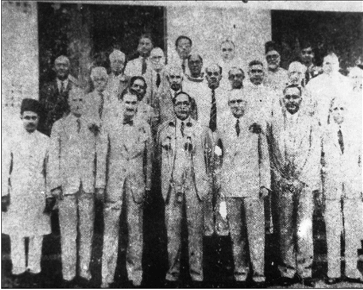Dr. B.R. Ambedkar and His Role in the Simon Commission
Dr. Bhimrao Ramji Ambedkar, a towering figure in Indian history, played a crucial role in shaping the country's political and social future. One of the key moments in his early political career was his involvement in the Simon Commission, which was sent to India in 1928 to recommend constitutional reforms. His participation in the discussions surrounding the commission marked a significant step in his lifelong fight for the rights of the Depressed Classes (Dalits) and their political representation.
nagsen
3/13/20252 min read


What Was the Simon Commission?
The Simon Commission was a group of seven British members of Parliament, led by Sir John Simon, that was sent to India in 1928 to assess the need for constitutional reforms. The commission was formed under the Government of India Act, 1919, which had introduced the system of diarchy (a dual system of governance) in provinces.
However, the commission faced strong opposition because it had no Indian members, leading to widespread protests across the country. The Indian National Congress and other political groups boycotted the commission, demanding Swaraj (self-rule) and Indian participation in framing their own constitution.
Dr. B.R. Ambedkar’s Involvement
While the Congress and other nationalist leaders opposed the Simon Commission, Dr. Ambedkar took a different approach. As a leader of the Depressed Classes, he saw this as an opportunity to present the demands of Dalits and other marginalized communities before the British government.
Key Contributions of Dr. Ambedkar:
Memorandum to the Simon Commission
In 1928, Dr. Ambedkar submitted a detailed memorandum titled "Statement of the Depressed Classes", outlining the struggles of Dalits in India.
He emphasized that political democracy without social democracy would be meaningless and demanded separate electorates for the Depressed Classes to ensure fair political representation.
His memorandum highlighted the social, economic, and educational backwardness of Dalits and stressed the need for protective measures in the new constitutional framework.
Advocating for Political Rights
Unlike the Congress, which primarily focused on Indian self-rule, Dr. Ambedkar insisted that political power should not be concentrated in the hands of the upper castes.
He argued that unless special provisions were made, Dalits would continue to face oppression, even in an independent India.
His advocacy led to the recognition that the Depressed Classes needed constitutional safeguards, paving the way for later political developments, including reserved seats in legislatures.
Impact on the Future Constitution of India
The demands put forward by Dr. Ambedkar during the Simon Commission discussions were later reflected in the Communal Award of 1932, which granted separate electorates to Dalits (later modified in the Poona Pact).
His participation in the constitutional discussions during British rule strengthened his position as the primary leader of Dalits in India, eventually leading to his role as the chief architect of the Indian Constitution.
Impact of Ambedkar’s Role in the Simon Commission
Increased Political Awareness: The commission became a platform for Ambedkar to highlight the issues of Dalits at a national and international level.
Strengthened Dalit Rights Movement: His active participation helped mobilize the Depressed Classes to demand political rights and social justice.
Foundation for Future Reforms: His arguments influenced later constitutional provisions, including reservation policies in education, employment, and politics.